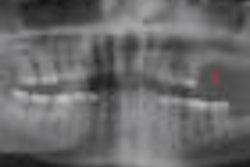Consider this: Your patient needs an extraction but has received oral bisphosphonate therapy.
Invasive procedures can go wrong in such cases because bisphosphonate drugs can cause the very rare, but serious, condition of osteonecrosis of the jaw, in which changes in bone cells and loss of blood supply can lead to uncontrolled bone infection.
So what is a dentist to do?
“The risks of infection and pain from not treating a decayed tooth or periodontal problem far outweigh the risk of bisphosphonate-associated osteonecrosis.”
— Peter L. Jacobsen, Ph.D., D.D.S.
A new report from the ADA's Council on Scientific Affairs (Journal of the American Dental Association, December 2008, Vol.139:12, pp. 1674-1677) provides recommendations for the management of patients who have been on oral bisphosphonate therapy. (For the full report, visit the ADA Web site.)
The report updates recommendations from 2006 and states that, for patients receiving oral bisphosphonate therapy, the risk of developing bisphosphonate-associated osteonecrosis (BON) of the jaw remains very low.
The authors recommend that routine dental treatment should not be changed because of oral bisphosphonate use.
"The risks of infection and pain from not treating a decayed tooth or periodontal problem far outweigh the risk of bisphosphonate-associated osteonecrosis," Peter L. Jacobsen, Ph.D., D.D.S., vice chairman of the ADA Council on Scientific Affairs and a member of the panel that compiled the report, told DrBiscuspid.com.
The report also notes that currently no screening and diagnostic test can predict a patient's risk of developing the condition. But new tests that could potentially identify patients at risk for BON are being developed and studied, according to Dr. Jacobsen.
"Recently, the use of serum levels of the collagen breakdown product C-terminal cross-linking telopeptide of type I collagen (CTX) has been advocated as a risk predictor for development of BON," wrote the authors. "Serum CTX and urinary N-telopeptide of type I collagen (NTX) are considered markers for bone resorption. Reports suggest that dental treatment decisions can be based on the results of serum CTX/NTX level tests."
However, these new research findings need to be corroborated by clinical studies, the authors noted.
The report also states that the use of IV bisphosphonates in cancer patients is associated with a much higher risk of osteonecrosis.
"The general dentist would be prudent to refer any surgical procedures in such patients to an oral surgeon or periodontist, depending on the patient's needs," Dr. Jacobsen told DrBiscuspid.com.
Still, treating patients who have received oral bisphosphonate therapy poses a conundrum for dentists. Should you take a conservative approach or perform procedures as usual since BON is such a rare condition?
The report authors generally recommend caution. For example, if surgery becomes necessary for patients with periodontal disease, the goal should be to obtain access to root surfaces. When necessary, the clinician should use modest bone-recontouring techniques, the authors noted.
For patients who need invasive oral surgery, the clinician should discuss alternative treatment plans, such as endodontic treatment followed by removal of the clinical crown, instead of extraction. This allows the roots to exfoliate on their own. Also, the authors suggest considering bridges and partial dentures instead of implants.
To prevent BON, the authors recommend limiting the possibility of extensive or multifocal surgical procedures.
"It may be prudent to proceed conservatively in some cases, allowing the practitioner to gain some insight into how a patient will heal before putting multiple quadrants at risk," they wrote. "On the other hand, periapical pathoses, sinus tracts, purulent periodontal pockets, severe periodontitis, and active abscesses that already involve the medullary bone all may exacerbate osteonecrosis, and these areas should be treated immediately even if multiple quadrants are involved."
Given the proven benefits of oral bisphosphonates in treating osteoporosis, patients should not change their medication without consulting their physicians, the authors cautioned.
While the benefits of bisphosphonate drugs outweigh the risks, agreed Sol Silverman, D.D.S., a professor of oral medicine at the University of California, San Francisco School of Dentistry, a patient who has a history of oral bisphosphonate use should be offered the most conservative treatment.
For example, if the dentist is going to do an invasive procedure such as an extraction, the patient should be informed of the low risk of necrosis and given the choice of an extraction or a root canal, Dr. Silverman said.
"The side effects of bisphosphonates, as related to dentistry, are very low," Dr. Jacobsen concluded. "Maintaining optimal oral health is the best way of further reducing these low risks."



















